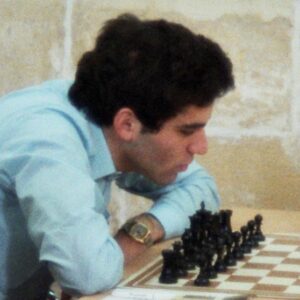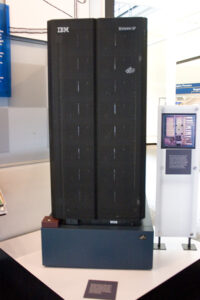
Created in the laboratories of Carnegie Mellon, in the dark corners of IBM, the computer program Deep Blue would seek its revenge after its humiliating defeat to reigning World Chess Champion Garry Kasparov. Garry Kasparov, born in the Soviet Union, was the youngest World Champion of the game at age 22. As World Chess Champion from 1985 to 2000, he would face many political, legal, and professional challenges such as the fall of the Soviet Union, the backlash of leaving Russia for Croatia, and his rivalry with Anatoly Karpov. However, Kasparov’s biggest obstacle would be the utter monstrosity of IBM’s Deep Blue.

Deep Blue first saw life as a chess-playing supercomputer under the name of ChipTest, developed by Feng-hsiung Hsu who was a doctoral student at Carnegie Mellon at the time. After a couple iterations, ChipTest evolved into Deep Thought, and with Hsu joining IBM Research team had an ambitious goal: To defeat the World Chess Champion. And so the first match between the Soviet Veteran Kasparov and Deep Thought took place in 1989. Garry humiliated the program by easily winning both games of the two-game match leaving Deep Thought and IBM in shambles. However, in the ashes of Deep Thought, the team designed Deep Blue to enact their revenge. And so the rematch with this new artificial intelligence and Kasparov was held in New York City in 1997.
In a highly publicized 6-game match, Kasparov took the initiative to win the first game against the cold circuited computer. However, as Kasparov started smoothly, game 2 proved to be the first critical test of AI in a game played over centuries. In a game of pattern recognition and creation of ideas, Deep Blue had managed to outdo the World Champion in both. Score now 1 to 1 Human to Computer. The next three games ended in draws. Finally, with his back against the wall, Kasparov took a risky approach in playing a dubious opening in order to win, only for it to backfire. For the first time in modern history, an AI had defeated the world champion in a match.
The drama of the aftermath was intense, with accusations of cheating being thrown around and IBM unwilling to release the computer logs. The event became the subject of the 2003 documentary film “Game Over: Kasparov and the Machine.” But it was a turning point for computer science and artificial intelligence. The aftermath of Deep Blue and other programs in the 1990s led to the idea of intelligent agents in computer science. An intelligent agent is a system that is able to perceive its environment, and as a result take action to maximize its chances of success. This idea in AI research resulted in the generalization that “AI goes beyond studying human intelligence, it studies all kinds of intelligence.”
Nowadays chess engines are far more sophisticated. The latest chess engine to make history is Leela Chess Zero, a supervised machine learning system. Unlike Deep Blue which heavily relied on fine tune adjustments of the program by chess masters, Leela develops its own internal logic and creates its own ideas to play the game of chess. Deep Blue has been greatly surpassed in capacity and capability by its successors, but it was the first in proving AIs could develop their own logic in special circumstances like the game of chess.
Peer Edited by Taylor Tibbs and Mark Geisler